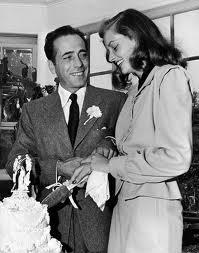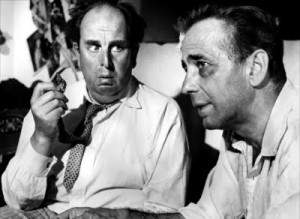I’d be remiss if I closed the week without posting something about the recently departed Lauren Bacall. After that beautiful published her memoirs at the end of 1978, she sat for an interview with Christopher P. Andersen of People. An excerpt:
“Question:
You were brought up to be a ‘nice Jewish girl,’ as you put it, but in Hollywood you hid that fact. Why?
Lauren Bacall:
So much more was made of my concealing it because I didn’t ‘look’ Jewish. There was anti-Semitism in Hollywood and I was terribly frightened. Remember, I was 19 and wasn’t exactly swimming in self-confidence. It’s one area of my life I am not proud of.
Question:
When you were going with Bogart, did you tell him you were Jewish?
Lauren Bacall:
Yes. I had once been asked out by a West Point cadet and the subject of religion came up. He never called back, and I was sure it was because I was a Jew. So when I fell in love with Bogie, I knew I had to damn well get it straight. Of course, he was the last man on earth it would have bothered.
Question:
Were you a great fan of Bogie’s before you met him?
Lauren Bacall:
Howard Hawks said he’d like to put me in a film with Cary Grant or Humphrey Bogart. I thought, ‘Cary Grant—terrific! Humphrey Bogart—yucch.’
Question:
Didn’t Howard Hawks help create your famous voice?
Lauren Bacall:
You can’t acquire a voice. Either you have it or you don’t. But Howard wanted me to be insolent with men on the screen, and that meant training my voice so it would remain low. I would park on Mulholland Drive—so as not to disturb the neighbors—and read The Robe aloud in a low, low voice. I was never much of a screecher anyway.
Question:
How did the Bacall ‘look’ come about?
Lauren Bacall:
I used to tremble from nerves so badly that the only way I could hold my head steady was to lower my chin practically to my chest and look up at Bogie. That was the beginning of the Look. I still get the shakes from time to time.
Question:
Are you the tough cookie most people think you are?
Lauren Bacall:
I never thought I was a tough cookie at all. When I was making To Have and Have Not Howard Hawks wanted an attitude of worldliness. At the time I was trying to figure out how a kid with absolutely no sexual experience could convey worldliness. The biggest misconception people have about me is that I’m in control of every situation. I’m rarely in control of any situation.
…
Question:
After Bogie’s death your brief engagement to Frank Sinatra ended abruptly. How do you view Sinatra today?
Lauren Bacall:
Frank did me a great favor. He saved me from the complete disaster our marriage would have been. But the truth is that he behaved like a complete shit. Still, that was over 20 years ago. When I run into him now, we give each other a nice hello.”


